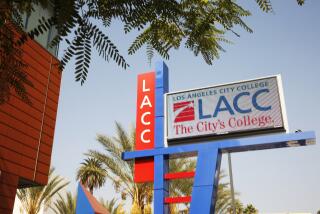A Family Opens Its Heart--and Its Wallet--to Help the Needy
- Share via
Sam Arthur bikes to work every day through the elegant neighborhoods of Wilmington, Del., and idly fantasizes about moving out of a small duplex and into one of the grand old homes there.
It’s not that he couldn’t afford it. It’s just that every year Arthur, a chemist, gives to charity nearly $40,000, about half of his pretax income.
The big house is a dream, really. He’s quite content living with his wife and two teenagers on, after taxes, about $35,000 a year. They live in a crowded neighborhood and drive old cars.
And each month, Judy Arthur sits down and writes about $3,300 worth of charitable checks to help starving children and church ministries.
The Arthurs, both in their 40s, are not “trust fund babies.” They don’t stand to inherit the millions that some of their fellow baby boomers can expect over the next few decades. A middle-class family, they work for everything they own--and choose to give away a huge portion.
Why?
“Heaven is much nicer than any of the houses in Wilmington, or Beverly Hills, for that matter,” Arthur said. “God has always blessed me . . . I feel an obligation to share that with everyone else.”
The Arthurs are unusual in the world of philanthropy. Most Americans, whether rich or poor, give about 1% to 3% of their annual income. The very poorest generally give less, and some of the richest give more. And those who give 10% are considered saints.
The very richest Americans--in the top 3.5%--give 40% of all charitable dollars. While some may give as much as 18% of their annual incomes, “that’s hardly anything compared to their wealth” of holdings, estate values, savings accounts and other assets, said Ann Kaplan, research director of the American Assn. of Fund Raising Councils.
But those like the Arthurs, who sacrifice enough to significantly alter their lifestyles, are rare.
“They are extraordinary donors,” Sally Digges said of the Arthurs. She represents Food for the Hungry, an international relief organization that receives 10% of the couple’s income. “In terms of dollars given, Food for the Hungry has several donors who give more. However, we are unaware of any donor who gives more in proportion to their income than the Arthurs.”
Karen File, coauthor of “Seven Faces of Philanthropy,” estimated that only 9% of major donors are philanthropists in the traditional sense, motivated by pure altruism, giving because it’s the right, moral thing to do.
“People active in the field say traditionally people who gave in America were from the best classes and the best families . . . the Rockefellers, Carnegies, Pews,” she said. “These people still exist and are incredibly active and an important segment of the donor community, but other kinds of wealthy people have emerged in America and have stepped forward to join them.”
Including altruists, File has identified seven types of philanthropists. Investors give primarily to get tax breaks. “Dynasts,” or heirs to fortunes, give because of family tradition. Repayers give to their alma maters or hospitals that saved a loved one as a reward for good service. Communitarians donate because it’s good business. Socialites donate because it’s fun, and it gives them a good reason to go to a black-tie ball or fashion show. The devout give for religious and spiritual reasons.
“It used to be that a fund-raiser could go to a donor organization and say, ‘Fund me because you should.’ But now fund-raisers have to become marketers of causes, and they have to think through what it is that wealthy donors want in exchange,” File said. “Communitarians won’t give because it’s a good cause. Communitarians want to be on the board. Socialites are not interested unless there’s an opportunity to have a very social side.”
Devotion to God motivates the Arthurs. They run a children’s Bible study class out of their home, and Arthur teaches Sunday school for adults. Occasionally, he espouses the moral duty and benefits of giving.
“I guess because we live a little close to the edge, it gives God an opportunity to come through and bless us in ways we didn’t expect--like getting our house inexpensively. Our friends gave us their kids’ clothes that they outgrew. It all adds up after a while.”
As one of five children, Arthur grew up in a Baptist home where his parents routinely donated about 10% of their income to their church. Now 46, he began his own philanthropic journey 25 years ago while a student at UC Berkeley. There, he was inspired by the writings of C.S. Lewis, a theologian whose witty prose was grounded with moral purpose. Lewis had given away 65% of his income and supported the mother of an Army buddy.
“He was very charitable, and that challenged me,” Arthur said. “My goal in college was to give 50% away. I picked that out of a hat.”
He’s almost there.
“I stalled out at around 40% or 45% because I didn’t anticipate how expensive kids would be,” Arthur said.
With two teenagers, money is tight, and sometimes squabbles arise with the Arthurs’ 18-year-old son, Joshua, and 15-year-old daughter, Emily.
“It’s usually, ‘Well, if you didn’t give your money away we could afford to do this,’ ” he mimicked his children. “They have expensive tastes, and their friends have expensive tastes. . . . We try to get them a nice prom dress or tuxedo and economize elsewhere, because the rites of passage are important too.”
But the sacrifices are real and, at times, difficult.
His son, who also plans to study chemistry, was accepted into Stanford and Harvard, but neither offered him scholarships. He is attending the University of North Carolina, which did. Disappointment is tempered by hopes that he may go to graduate school at one of those two universities, free, as a teacher’s assistant.
His children have grown up living frugally. “It’s like wearing seat belts,” he said. “If the kid was belted in as a baby, they don’t mind growing up wearing a seat belt. They’ve grown up knowing how we spend money, and they buy into that. It would be a lot tougher to retrofit.”
In fact, Joshua and Emily already donate 10% of their earnings from baby-sitting and summer jobs to their church, voluntarily.
The Arthurs have spent more than two decades building their charitable donations. Giving away a substantial part of raises and bonuses is the best way to start, he said. And when his wife inherited just enough money to pay off their mortgage, they sent the $170 monthly mortgage payment to support a missionary.
“It was easier to start when you don’t have anything. You get into a lifestyle and it perpetuates itself,” he said. “You grow into it.”
At the same time, the couple is also planning for the future, saving 6% of their income for retirement.
“In 30 or 40 years, it won’t matter what kind of car I drove or house I buy. Then I’ll be answerable for how I used the resources God gave me,” he said. “God has always blessed me. He has given me a good job. I feel an obligation to share that with everyone else.”


